
First Lady Michelle Obama and the President’s first Chief of Staff Rahm Emanuel.
The conflict between First Lady Michelle Obama and the President’s first Chief of Staff Rahm Emanuel exposed in the book The Obamas by New York Times reporter Jodi Kantor may offer new insights into the popular presidential wife’s political acumen – but its the same old story about the boss’s wife. Any election year attacks on Michelle Obama for her involvement in the presidency, however, will strike the same false notes heard twenty-five years ago, when they were leveled against Nancy Reagan. Basing such attacks on the premise that voters do not elect a First Lady to become involved in managing the presidency is overridden by the fact that Presidents do.
And while the contention that if she hadn’t married him, she’d have no such power is obvious, far more rarely acknowledged is the fact that, if he hadn’t married her, he’d unlikely have obtained his power. In the climb to the White House, the men who would become Presidents found they thrived with a partner committed to managing the business of their lives. First Ladies are deeply imbedded into a President’s functioning long before Inauguration Day.
A Chief of Staff can seek access into a President’s thoughts, but only a First Lady holds the key to explore his soul. Based on that inexplicable alchemy of human relationship, a First Lady’s emotional influence on a President is the most elusive aspect of her political role and potentially the most important. And while it may seem obvious that those involved in policy might challenge a Chief of Staff’s rule, those defined as “traditional wives” can more devastatingly challenge the staff’s competence, motives and indispensability by simply claiming the right to do so as a “concerned wife” seeking to “protect my husband.” Short of a Constitutional amendment requiring that Presidents be unmarried, there’s no getting around the “wild card” of the executive branch. In their “zone of privacy,” a First Lady faces the real person who suits up into a presidential persona. She can forcefully contradict him, relay information nobody else dares to, suggest improvements on a speech he reads in bed, pose searching questions to help him reaffirm his mission, detect when he’s overscheduled or isolated and seek to rectify it.
Without having to make frequent appearances in the West Wing, a First Lady can also raise credibility questions about his Chief of Staff by asking why he isn’t doing some of this. In fact, the more ephemeral her presence there, the more formidably her shadow is perceived, especially if a President arrives in the morning with an approach on a matter which differs from his thinking the night before. If a First Lady’s influence can fuel a Chief of Staff’s jealousy and her contradicting his advice can lead to resentment, no Chief of Staff has been known to complain about a First Lady to a President. Other undermining methods are used, such as committing her to attend events without prior approval, limiting her staff budgets, denying them access to briefings, ignoring her requests or suggestions, or preventing her from joint appearances with the President. Some First Ladies react with passive resistance, others just acquiesce.
However, when a First Lady learns about an ineffective or dictatorial Chief of Staff placing his self-interests above those of the President, the battle begins. It usually ends the same way. Many a President has asked for the resignation of a Chief of Staff.
None have divorced their wives.
~~~~~~~~~~~~~~~~~~~~~~~~~~
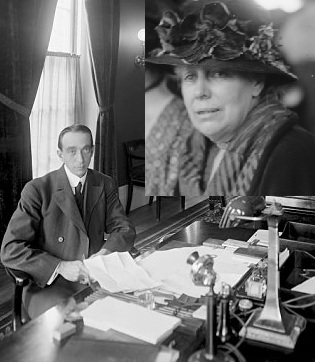
The beleagured President’s Chief of Staff Fred Carpenter and the bane of his existence, First Lady Nellie Taft.
The first time whispers about conflict between a First Lady and a Chief of Staff went public was 102 years ago when the White House announced that Fred Carpenter, the President’s Secretary (a title then analogous to the contemporary term “Chief of Staff,” used here throughout for the sake of consistency) had been named Ambassador to Morocco. The truth about Carpenter’s “promotion,” however, broke with a June 5, 1910 New York Times story headlined, “Pity the Sorrows of the President’s Secretary,” and revealed that:
When Mrs. Taft expressed disapproval of things in general or particular.…Carpenter’s teeth chattered…Had Secretary Carpenter possessed as strong a champion in Mrs. [Nellie] Taft as Mr. [William] Loeb [Secretary to President Theodore Roosevelt] had in Mrs. [Edith] Roosevelt, it is quite likely that he would have found his pathway smoother and would not have fled to Morocco.

Martha Washington and Tobias Lear.
Martha Washington never disclosed her true opinion of Tobias Lear, Chief of Staff to her husband, the first President George Washington. When she arrived at the presidential mansion in May of 1789, a month after her husband’s inauguration, she found a list of protocol limitations and scheduled events which he’d drawn up and expected her to follow. She soon sniped in a family letter that it left her feeling like a “state prisoner.” She and the President were outraged when they discovered Lear pocketed some of their money, collected on their behalf. He had a bit of an insurance policy on keeping Martha’s begrudging tolerance. When his first wife died, he married the President’s niece. When she died, he married the First Lady’s niece.

First Lady Abigail Adams and her son, the President’s Private Secretary Thomas Adams.
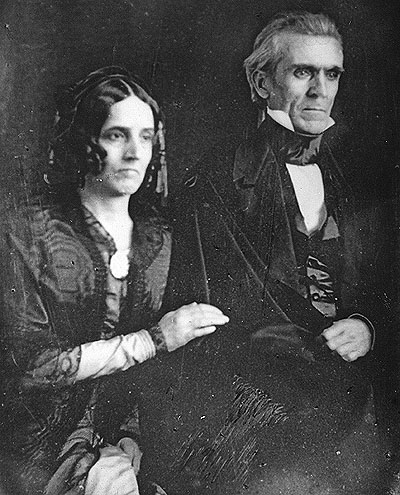
Sarah Polk fulfilled the duties of both First Lady and the President’s private Chief of Staff.
The early Presidents had to salary their own “Private Secretary,” and hired needy nephews and their own sons, a practice they continued even after discovering a way to have them federally-salaried, by requisitioning a federal Land Office clerk position to the White House.
As both First Lady and mother of the President’s Chief of Staff, Abigail Adams felt free to openly belittle the way her 26 year old son Thomas conducted his job during the last two years of the presidency. Similarly, Abigail Fillmore always felt the need to tell her son Powers how to improve his work habits in the White House. When her cousin Ned Coles, Chief of Staff to her husband James Madison was ill with a fever, First Lady Dolley Madison felt herself qualified to simply take on his job – in the midst of war. Sarah Polk improved on this and avoided any family conflicts. The President’s nephew was assigned the more mundane secretarial duties while she took on both the First Lady and Chief of Staff roles, making herself more trusted a presidential adviser than any Cabinet member.
As the presidency grew, so too did the tasks and status of the Chief of Staff and the First Ladies. Without a staff of their own, First Ladies depended on those working for their husbands with often presumptuous demands.
Sidney Webster, President Franklin Pierce’s Chief of Staff, although sympathetic to the severe depression of religiously zealous Jane Pierce resented her directive that he and the executive clerks all attend church services on Sunday, their only day off. But they went.
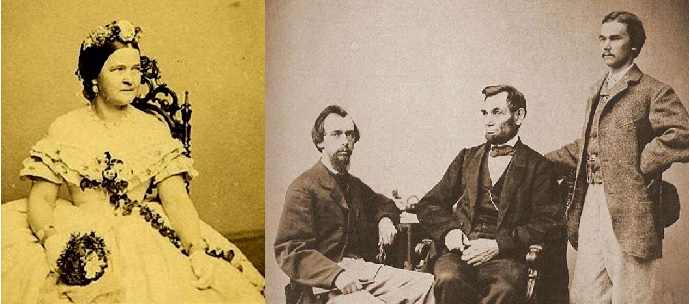
First Lady Mary Lincoln and President Abraham Lincoln with his two primary aides and advisors, John Nicolay (l) and John Hay (r).
There was no more contentious relationship between a First Lady and the President’s chief aides than that of Mary Lincoln’s with John Hay and John Nicolay. She contradicted both of the young men whose loyalty to the Civil War president was as intense as his wife’s. She snapped at them for making any decision related to Abraham Lincoln’s personal life which she believed usurped her rights as his wife. She also demanded their time and attention in seeing to minor political appointments she wanted made. Behind her back they circulated their derisive nicknames for her, “the Hellcat,” and “La Reine,” but neither Hay nor Nicolay ever approached the President about the problem of his wife. Mary Lincoln, in contrast, complained openly to him of those she considered as not serving him well. The President neither fired Hay nor Nicolay – and never asked his wife to cease involving herself in his work.

Orville Babcock and Julia Grant.
Ignoring her own indirect role in one of her husband’s Administration scandals, Black Friday, in which she was accused of mightily profiting, Julia Grant’s persistent mistrust of the President’s third Chief of Staff, Orville Babcock, fell on deaf ears with the chief executive who was loyal to a fault. Babcock was accused with no only bribery for jobs in the executive departments, but indicted in the Whiskey Ring scandal. Babcock was defended by President Grant in a historical deposition in 1876 that resulted in acquittal. Julia Grant, however, long blamed Babcock for tainting the Grant Administration.
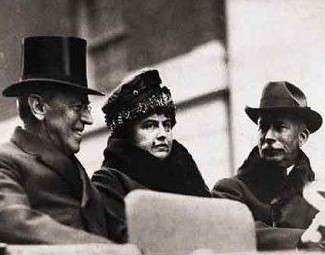
First Lady Edith Wilson came between her husband the President and his chief advisor Colonel Edward House – literally and figuratively.
Edith Wilson, who married the widowed incumbent President Woodrow Wilson in 1915 had both a long memory and a lot of patience. Learning of how vigorously the President’s primary adviser Colonel Edward House and Press Secretary Joseph Tumulty had urged Wilson not to marry her, for fear of how his doing so so shortly after his first wife’s death might affect his 1916 re-election, she harbored a deep resentment of not only their influence over him but fears that she would isolate him. When the President suffered his massive stroke in 1918, and Edith Wilson began running the presidency as best she could, she got the chance to prove their worst fears. She refused to let House have any further, direct contact with her husband ever again, and diminished Tumulty into nothing more than her own servant, to help prevent the truth of Wilson’s condition from the public.
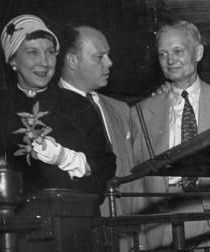
Mamie Eisenhower at far left, and Sherman Adams (far rigt).
Mamie Eisenhower learned all she needed to know about Chief of Staff Sherman Adams during the 1952 campaign when she found that he had taken the suite connected to her husband and put her down the hall. Finally, at one hotel, Adams found the room he reserved for himself already taken by an early-arriving Mamie. She never gave him the chance to presume unfettered access to the President, refusing to permit the Chief of Staff into the family quarters or to socialize with him. When a Congressional investigation determined that Adams had inappropriately accepted personal gifts from a manufacturer in violation of Federal Trade Commission rules, Mamie urged Ike to get rid of him as soon as possible. Unable to do so himself, the President asked Vice President Nixon to tells Adams he had to resign. It was a primary reason Mamie Eisenhower felt perpetual gratitude to Nixon and praised his loyalty to her husband.
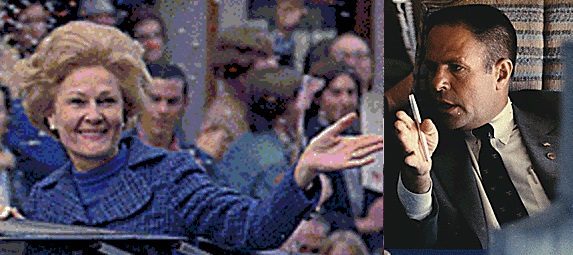
First Lady Pat Nixon and Chief of Staff H.R. Haldeman.
Nixon was less successful in managing the conflict which arose between his wife First Lady Pat Nixon and Chief of Staff, H.R. “Bob” Haldeman. Not only did Haldeman determine to use her as a public relations venue, but he chose the first Chief of Staff to a First Lady to carry out his mission. He hadn’t counted on the woman, Connie Stuart, looking out after Mrs. Nixon’s interests more than his own, nor her resistance to his orders. She was soon fired. The conflict between a First Lady’s concerns for the President’s personal interests versus the Chief of Staff’s focus on the political agenda was dramatically illustrated under Nixon. The deeper he drew on Haldeman’s questionable advice, the further he pulled away from his honest wife’s sensibilities. One of her friends later claimed that Pat Nixon had urged the President to burn his secret Oval Office tape recordings while they were still legally considered personal property, an idea not endorsed by Haldeman and which soon resulted in the tapes being subpoenaed and incriminating Nixon in the Watergate scandal which forced his resignation. When Haldeman had been forced to resign, it was not insignificant that Mrs. Nixon issued no well-wishing farewell message.

Jacqueline Kennedy with her husband; the President’s speechwriter and advisor Ted Sorensen, at right.
If Pat Nixon never voiced her concerns with the President, Jackie Kennedy tried to do so with her President. As suggested in her recently-opened oral history taped interview, Jackie Kennedy held a dim view of some of her husband’s senior staff, especially appalled at what she considered the self-serving unctuousness of advisor Ted Sorensen. Feeling that the young speechwriter took far too much credit for his work in a way that belittled the President, she was also bewildered by how her husband shrugged off her concerns as part of the way politics worked.
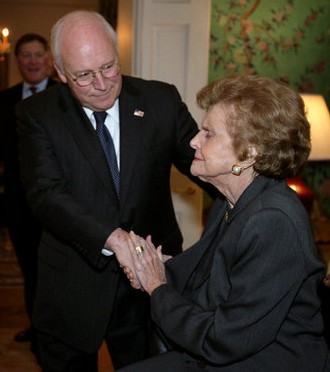
Former First Lady Betty Ford and Former Presidential Chief of Staff Dick Cheney.
Betty Ford may have broken the old-school First Lady rule of avoiding hotly contentious public issues when she openly talked about the Supreme Court decision no longer making abortion illegal, marijuana use by young people, her own discovery and treatment of breast cancer and her advocacy of the Equal Rights Amendment. Her husband’s Chief of Staff Dick Cheney, however, found her to be a threat to the President’s approval ratings and political capital. While he did not openly contest the First Lady, his colleague Don Rumsfeld refused to cooperate with the requests of her staff to be fully integrated into the Administration and its agenda. Mrs. Ford’s Press Secretary later concluded that while Cheney and Rumsfeld thought the First Lady to be a sassy and colorful sidelight of the Ford Administration, to the end they resented her popularity and thought her role insignificant.
Few First Ladies stood their ground against a Chief of Staff with more affirmative conviction in defense of her husband’s reputation than did Nancy Reagan. From the time former Treasury Secretary Don Regan was made Ronald Reagan’s Chief of Staff in 1985 until he was forced to resign in 1986, he displayed a smug rudeness which earned him the moniker of “Prime Minister.” She first became concerned after learning that Regan ordered the presidential helicopter for his own use while the President was recovering from cancer surgery. The more arrogant and politically damaging of his actions were publicly disclosed in the Tower Report, blaming him for misleading the public in the wake of the Iran-Contra scandal. The First Lady’s efforts to speak with him and their disagreements over the President’s schedule led the Chief of Staff to famously slam the phone done on her. Urged and pressed by many in the Administration – including the Vice President – to convince the President to fire Regan, she made her case and the Chief of Staff was finally replaced.
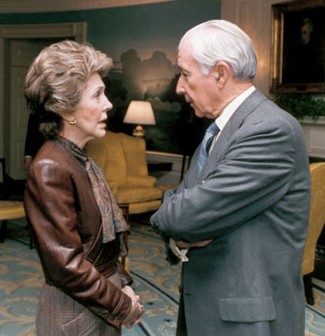
First Lady Nancy Reagan and President Reagan’s later Chief of Staff Don Regan.
The deposed Chief of Staff reacted by publishing a sensational memoir in which he disclosed her request that astrology be used in the president’s official scheduling; no such personal revelations had previously been cast against an incumbent First Lady before to the degree that they were by Regan. Still, most in the Administration was relieved to see him go and grateful to the First Lady. Years later, Mrs. Reagan completely forgave him.
Categories: First Families, First Ladies, History, Politics, Presidents, The Eisenhowers, The Kennedys, The Lincolns, The Nixons, The Obamas, The Reagans, The Wilsons
Tags: First Lady, Jodi Kantor, Michelle Obama, New York Times, Rahm Emanuel, White House
 Jackie & The Nixons: Mrs. Kennedy Returns to the White House, With New Images of the Visit
Jackie & The Nixons: Mrs. Kennedy Returns to the White House, With New Images of the Visit  Jane & Jill, Potential First Ladies: Lots in Common Between the Wives of Joe Biden & Bernie Sanders
Jane & Jill, Potential First Ladies: Lots in Common Between the Wives of Joe Biden & Bernie Sanders  The President as King: A Political Cartoon History
The President as King: A Political Cartoon History  All The Presidents’ Birthdays: Dance Balls to Movie Star Fundraisers in 90 Rare Photos
All The Presidents’ Birthdays: Dance Balls to Movie Star Fundraisers in 90 Rare Photos  The First White House Valentine’s Day Dance: the McKinleys, Ragtime, Racism & The Romance of the “Ghost Girls”
The First White House Valentine’s Day Dance: the McKinleys, Ragtime, Racism & The Romance of the “Ghost Girls”  Liz Taylor Meets Jackie Kennedy: Tabloid Fantasy to Chance Encounter & The Only Photos of Them Together, Part I
Liz Taylor Meets Jackie Kennedy: Tabloid Fantasy to Chance Encounter & The Only Photos of Them Together, Part I
Here I go, again –
Grace Coolidge was often blindsided by events at the White House that involved her participation. She asked the president if she might have a daily schedule. “Silent Cal” is reported to have said, “Now, Grace. We don’t give out that information promiscuously.”
RR’s Chief of Staff, Don Regan, looks a great deal like Mr. Beverly Harmon, the maintenance man so often scolded by Captain Peacock for being on the floor during opening hours in British sitcom “Are You Being Served?”
And please give “going” or rather giving, because you provide the “Coolidge Context” well – as only you can Jim. As for the Regan-Harmon resemblance, it reminds me of a story about Diane Vreeland once having lunch at Maxim’s in Paris and staring at a surly bald-headed French waiter, then telling her friend (Jackie Onassis) – “A bit reminiscent of Mussolini, don’t you think? Mmmm. Or maybe Don Rickles.”
Thanks for sharing this. Great research, and a fun read!
As always I appreciate this – especially knowing how hard you work to be current with your blog – still4hill.wordpress.com
As always, thank you so much for all the work you put into these blogs. I am also excited to see these in my email. It is a great history lesson and I appreciate all the work that goes into what you produce for us. Thank You! As my grandmother would have said – “You are mench!”.
Why do you think Mrs. Nixon was not successful with getting rid of Mr. Halderman – in addition, why was Mrs. Nixon treated like a second class citizen – yet from I have read, she was a kind, intelligent, and thoughtful First Lady – Mrs. Nixon is another of the first ladies who I feel never has gotten the credit do to her.
Any thoughts?
Many thanks –
David
I won’t be modest on this one – those introductory paragraphs took way hell of a long time – alot of breaking things down to analyze and then distill without making it sound like an academic study….as for Mrs. Nixon, I will be writing a good solid piece about her at the time of her centennial in two months….so keep an eye out. Thanks for noticing David….
Was hoping you write on this Carl–as only you can. When the story first broke about the Kantor book, I thought “Here we go again!” Every FLOTUS of recent memory has certainly come under these kinds of attacks–and regardless of political persuasion or personal style. Nancy Reagan: too bossy and brittle; Barbara Bush: didn’t suffer fools; Hillary Clinton: well, what wasn’t said? Laura Bush: a Stepford Wife with an East Wing staff in disarray; Roslynn Carter sat in Cabinet meetings. Betty Ford was too candid, but Pat Nixon was too reserved and “shut down.” Jackie too fancy, Lady Bird too folksy. Mamie, Bess, Eleanor (!). Truly, all of these women had to have a very strong exterior to abide the slings and arrows. And perhaps the only common thread among them all, was an abiding and unwavering loyalty to their husband and ultimately to his legacy.
Now it’s the Obama’s turn to have a “controversial”book about themselves in their WH Library. (one of these days, I’ll have to check that room out and see what the holdings are). I am a bit confused that the author of the bk is Jodi Kantor? (sp?) as I was expecting a sizzling tell-all from a writer named Edward Klein. He had written several bks on the Kennedy’s (All Too Human, The Kennedy Curse, Just Jackie & a bio on Ted Kennedy. I had read about Mr. Klein going to Chicago to interview people who knew the Obama’s socially. Mr. Klein suggested that there are/were steamy alegations re the “strange” marriage of the Obamas.
Klein seemed to hint that people working at the WH, in any capacity were discouraged from speaking about the couple in terms of their marital and family relations. This sure sounded like a whopper of a tell-all. (How on earth, can there be anything “strange or werid” about a very attractive young couple in the WH with two adorable girls, who are just coming of age.)?? I’ve read lots of lurid headlines promoting revelations of rich and famous; but not about people like the Obamasl Michelle and Barack do have a bit of exotic background, being the 1st African-Americans and the President’s revealing memoirs about his own unconventional childhood. From what I see at my lowly vantage point are two respectable adults and their kids having a very interesting life in the WH. They also appear to be very happy. So far I don’t see them being of interest to Kitty Kelly, but Mr. Klein seems to think otherwise. Ms. Kantor’s bk is causing a bit of a to-do, but still nothing catastrophic to bring Obama down.
I seem to recall that Mr. Klein hoped to have his bk out before the 1st of the yr 2012. Now, I am reading about Ms. Kantor’s book. It sounds like she is covering some of the same territory that Klein had aluded to. I don’t know what is going on here, but I will do more investigating re Edward Klein’s effort. I had read his books on Jackie and Bobby, they were OK, but on the slim side in more ways than just content. Mrs. Kennedy was, until her daughter put out her Oral History, a very difficult person for a journalist or historian like you, to acess for a book. Mrs. Kennedy-Onassis was vigilent about her privacy and her daughter Caroline even more so. But that is beside the point, I was hoping Mr. Klein would finally come out with a book of substance. Presidents and their familys offer awesome entertainment, as you well know:)..
I am wondering, Carl, if you know anything about this effort by Mr. Kelin? It has certainly happened before that two or more writers of a biography will come out with a bk. on same subject. We usually find new memoirs and biographys coming out on the birthdays or anniversary of-death-days, as well.
Thanks S. for your really thorough thinking through all of this, something I greatly appreciate. I too seem to recall Klein was supposed to do a book about the President and Mrs. Obama. That said = perhaps it came out already. I try to keep my own thoughts about the efforts of other writers, particularly if in the same field as is the case here. I will speak out when my material has been plagiarized and I believe it was Christopher Anderson who wrote a book on Mrs. Onassis and opened it with a direct anecdote taken verbatim from my own interview with Mrs. Clinton about when the two First Ladies were swimming together and the former yelled up to the latter (on a ladder!) not to jump if she didn’t want to, meaning don’t give in to pressure. When someone generates a direct quote from someone in an interview they retain the copyright…anyway, getting off track here…the point all that any book which is unfooted is always difficult to document later on. Klein, Anderson had professional careers as popular magazine writers beforehand, but having read Jodi Kantor’s book as well as her coverage in the New York Times, I would have to say there is rigor and nuance in whatever she pens; she is not the sort to state she had cooperation from White House staff when that is not true. Also, reading her book makes it very clear in plain factual progression the necessary and traditional judgement Mrs. Obama has gone through. In some respects, it echoes Laura Bush’s own memoirs in which she details the time and incidents which, over time, made her adjust to this life. I think if people read the book they will see that it is not negative or suggest unwarranted conclusions.
Love this piece. Learned a lot, as always from you.
Thanks so much Steve…that’s what I’m always hoping for….
ERRATA: dear Carl, the caption under kennedys pic, is indeed ted …sorenSEN *wink*
will check and correct. thanks.